Hospitality Industry Leadership and Trends
VerifiedAdded on 2020/06/05
|6
|2800
|417
AI Summary
The assignment explores various leadership styles prevalent in the hospitality sector and examines their effectiveness. It delves into the essential stages of management within this industry, emphasizing the significance of planning, organizing, coordinating, staffing, leading, controlling, and evaluating. Furthermore, the document highlights current trends shaping the hospitality landscape, including corporate social responsibility initiatives and technological advancements.
Contribute Materials
Your contribution can guide someone’s learning journey. Share your
documents today.
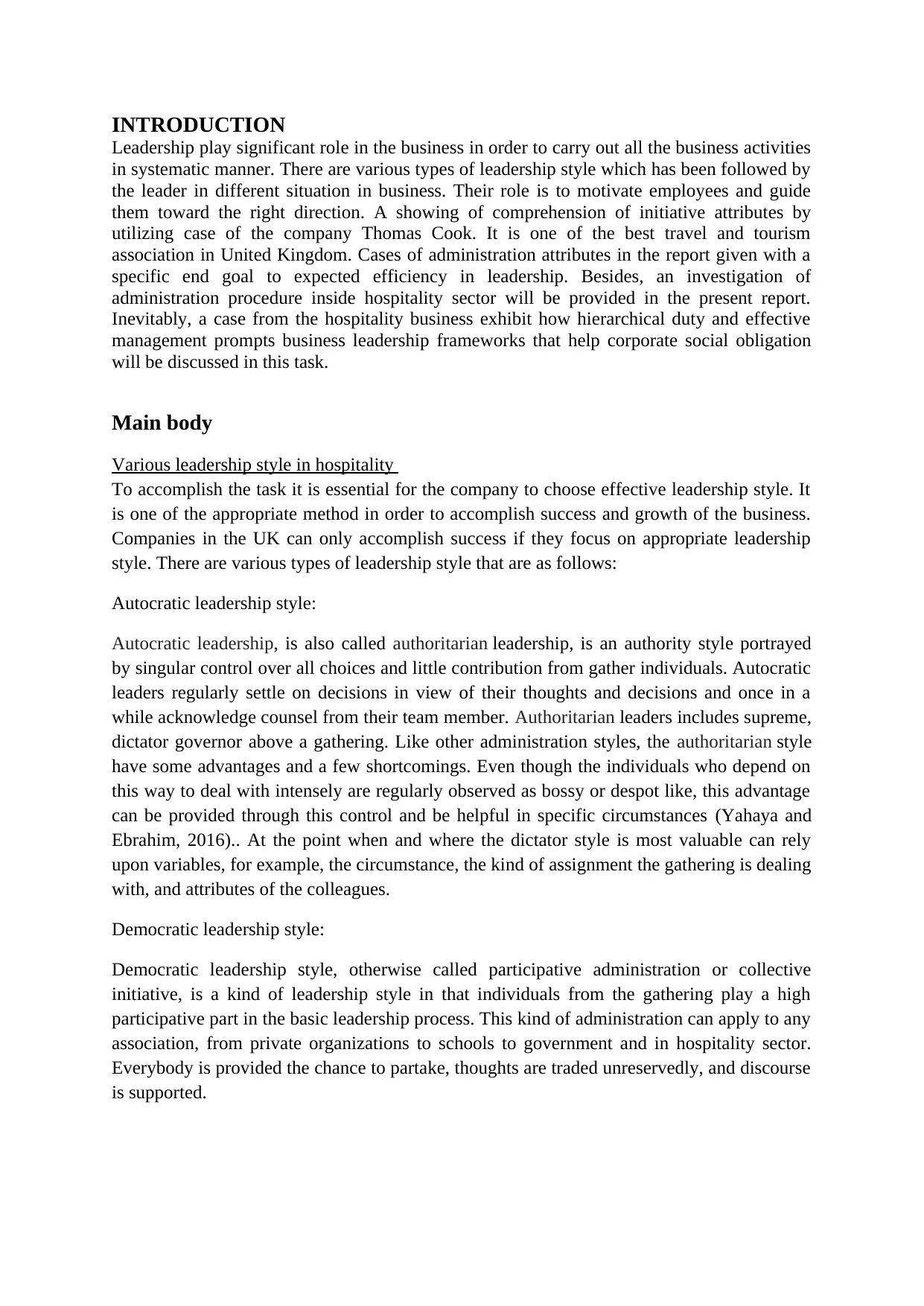
INTRODUCTION
Leadership play significant role in the business in order to carry out all the business activities
in systematic manner. There are various types of leadership style which has been followed by
the leader in different situation in business. Their role is to motivate employees and guide
them toward the right direction. A showing of comprehension of initiative attributes by
utilizing case of the company Thomas Cook. It is one of the best travel and tourism
association in United Kingdom. Cases of administration attributes in the report given with a
specific end goal to expected efficiency in leadership. Besides, an investigation of
administration procedure inside hospitality sector will be provided in the present report.
Inevitably, a case from the hospitality business exhibit how hierarchical duty and effective
management prompts business leadership frameworks that help corporate social obligation
will be discussed in this task.
Main body
Various leadership style in hospitality
To accomplish the task it is essential for the company to choose effective leadership style. It
is one of the appropriate method in order to accomplish success and growth of the business.
Companies in the UK can only accomplish success if they focus on appropriate leadership
style. There are various types of leadership style that are as follows:
Autocratic leadership style:
Autocratic leadership, is also called authoritarian leadership, is an authority style portrayed
by singular control over all choices and little contribution from gather individuals. Autocratic
leaders regularly settle on decisions in view of their thoughts and decisions and once in a
while acknowledge counsel from their team member. Authoritarian leaders includes supreme,
dictator governor above a gathering. Like other administration styles, the authoritarian style
have some advantages and a few shortcomings. Even though the individuals who depend on
this way to deal with intensely are regularly observed as bossy or despot like, this advantage
can be provided through this control and be helpful in specific circumstances (Yahaya and
Ebrahim, 2016).. At the point when and where the dictator style is most valuable can rely
upon variables, for example, the circumstance, the kind of assignment the gathering is dealing
with, and attributes of the colleagues.
Democratic leadership style:
Democratic leadership style, otherwise called participative administration or collective
initiative, is a kind of leadership style in that individuals from the gathering play a high
participative part in the basic leadership process. This kind of administration can apply to any
association, from private organizations to schools to government and in hospitality sector.
Everybody is provided the chance to partake, thoughts are traded unreservedly, and discourse
is supported.
Leadership play significant role in the business in order to carry out all the business activities
in systematic manner. There are various types of leadership style which has been followed by
the leader in different situation in business. Their role is to motivate employees and guide
them toward the right direction. A showing of comprehension of initiative attributes by
utilizing case of the company Thomas Cook. It is one of the best travel and tourism
association in United Kingdom. Cases of administration attributes in the report given with a
specific end goal to expected efficiency in leadership. Besides, an investigation of
administration procedure inside hospitality sector will be provided in the present report.
Inevitably, a case from the hospitality business exhibit how hierarchical duty and effective
management prompts business leadership frameworks that help corporate social obligation
will be discussed in this task.
Main body
Various leadership style in hospitality
To accomplish the task it is essential for the company to choose effective leadership style. It
is one of the appropriate method in order to accomplish success and growth of the business.
Companies in the UK can only accomplish success if they focus on appropriate leadership
style. There are various types of leadership style that are as follows:
Autocratic leadership style:
Autocratic leadership, is also called authoritarian leadership, is an authority style portrayed
by singular control over all choices and little contribution from gather individuals. Autocratic
leaders regularly settle on decisions in view of their thoughts and decisions and once in a
while acknowledge counsel from their team member. Authoritarian leaders includes supreme,
dictator governor above a gathering. Like other administration styles, the authoritarian style
have some advantages and a few shortcomings. Even though the individuals who depend on
this way to deal with intensely are regularly observed as bossy or despot like, this advantage
can be provided through this control and be helpful in specific circumstances (Yahaya and
Ebrahim, 2016).. At the point when and where the dictator style is most valuable can rely
upon variables, for example, the circumstance, the kind of assignment the gathering is dealing
with, and attributes of the colleagues.
Democratic leadership style:
Democratic leadership style, otherwise called participative administration or collective
initiative, is a kind of leadership style in that individuals from the gathering play a high
participative part in the basic leadership process. This kind of administration can apply to any
association, from private organizations to schools to government and in hospitality sector.
Everybody is provided the chance to partake, thoughts are traded unreservedly, and discourse
is supported.
Secure Best Marks with AI Grader
Need help grading? Try our AI Grader for instant feedback on your assignments.
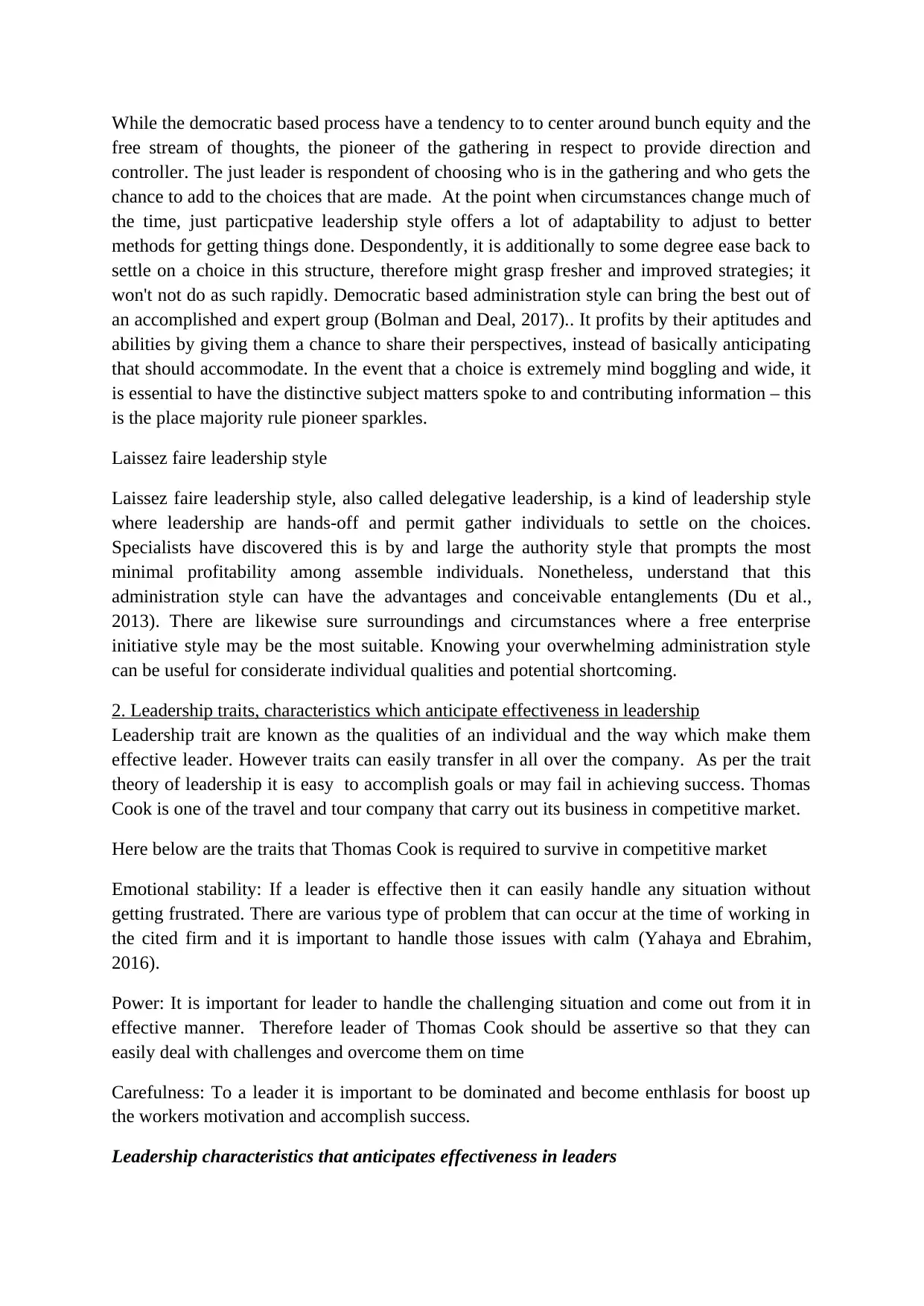
While the democratic based process have a tendency to to center around bunch equity and the
free stream of thoughts, the pioneer of the gathering in respect to provide direction and
controller. The just leader is respondent of choosing who is in the gathering and who gets the
chance to add to the choices that are made. At the point when circumstances change much of
the time, just particpative leadership style offers a lot of adaptability to adjust to better
methods for getting things done. Despondently, it is additionally to some degree ease back to
settle on a choice in this structure, therefore might grasp fresher and improved strategies; it
won't not do as such rapidly. Democratic based administration style can bring the best out of
an accomplished and expert group (Bolman and Deal, 2017).. It profits by their aptitudes and
abilities by giving them a chance to share their perspectives, instead of basically anticipating
that should accommodate. In the event that a choice is extremely mind boggling and wide, it
is essential to have the distinctive subject matters spoke to and contributing information – this
is the place majority rule pioneer sparkles.
Laissez faire leadership style
Laissez faire leadership style, also called delegative leadership, is a kind of leadership style
where leadership are hands-off and permit gather individuals to settle on the choices.
Specialists have discovered this is by and large the authority style that prompts the most
minimal profitability among assemble individuals. Nonetheless, understand that this
administration style can have the advantages and conceivable entanglements (Du et al.,
2013). There are likewise sure surroundings and circumstances where a free enterprise
initiative style may be the most suitable. Knowing your overwhelming administration style
can be useful for considerate individual qualities and potential shortcoming.
2. Leadership traits, characteristics which anticipate effectiveness in leadership
Leadership trait are known as the qualities of an individual and the way which make them
effective leader. However traits can easily transfer in all over the company. As per the trait
theory of leadership it is easy to accomplish goals or may fail in achieving success. Thomas
Cook is one of the travel and tour company that carry out its business in competitive market.
Here below are the traits that Thomas Cook is required to survive in competitive market
Emotional stability: If a leader is effective then it can easily handle any situation without
getting frustrated. There are various type of problem that can occur at the time of working in
the cited firm and it is important to handle those issues with calm (Yahaya and Ebrahim,
2016).
Power: It is important for leader to handle the challenging situation and come out from it in
effective manner. Therefore leader of Thomas Cook should be assertive so that they can
easily deal with challenges and overcome them on time
Carefulness: To a leader it is important to be dominated and become enthlasis for boost up
the workers motivation and accomplish success.
Leadership characteristics that anticipates effectiveness in leaders
free stream of thoughts, the pioneer of the gathering in respect to provide direction and
controller. The just leader is respondent of choosing who is in the gathering and who gets the
chance to add to the choices that are made. At the point when circumstances change much of
the time, just particpative leadership style offers a lot of adaptability to adjust to better
methods for getting things done. Despondently, it is additionally to some degree ease back to
settle on a choice in this structure, therefore might grasp fresher and improved strategies; it
won't not do as such rapidly. Democratic based administration style can bring the best out of
an accomplished and expert group (Bolman and Deal, 2017).. It profits by their aptitudes and
abilities by giving them a chance to share their perspectives, instead of basically anticipating
that should accommodate. In the event that a choice is extremely mind boggling and wide, it
is essential to have the distinctive subject matters spoke to and contributing information – this
is the place majority rule pioneer sparkles.
Laissez faire leadership style
Laissez faire leadership style, also called delegative leadership, is a kind of leadership style
where leadership are hands-off and permit gather individuals to settle on the choices.
Specialists have discovered this is by and large the authority style that prompts the most
minimal profitability among assemble individuals. Nonetheless, understand that this
administration style can have the advantages and conceivable entanglements (Du et al.,
2013). There are likewise sure surroundings and circumstances where a free enterprise
initiative style may be the most suitable. Knowing your overwhelming administration style
can be useful for considerate individual qualities and potential shortcoming.
2. Leadership traits, characteristics which anticipate effectiveness in leadership
Leadership trait are known as the qualities of an individual and the way which make them
effective leader. However traits can easily transfer in all over the company. As per the trait
theory of leadership it is easy to accomplish goals or may fail in achieving success. Thomas
Cook is one of the travel and tour company that carry out its business in competitive market.
Here below are the traits that Thomas Cook is required to survive in competitive market
Emotional stability: If a leader is effective then it can easily handle any situation without
getting frustrated. There are various type of problem that can occur at the time of working in
the cited firm and it is important to handle those issues with calm (Yahaya and Ebrahim,
2016).
Power: It is important for leader to handle the challenging situation and come out from it in
effective manner. Therefore leader of Thomas Cook should be assertive so that they can
easily deal with challenges and overcome them on time
Carefulness: To a leader it is important to be dominated and become enthlasis for boost up
the workers motivation and accomplish success.
Leadership characteristics that anticipates effectiveness in leaders
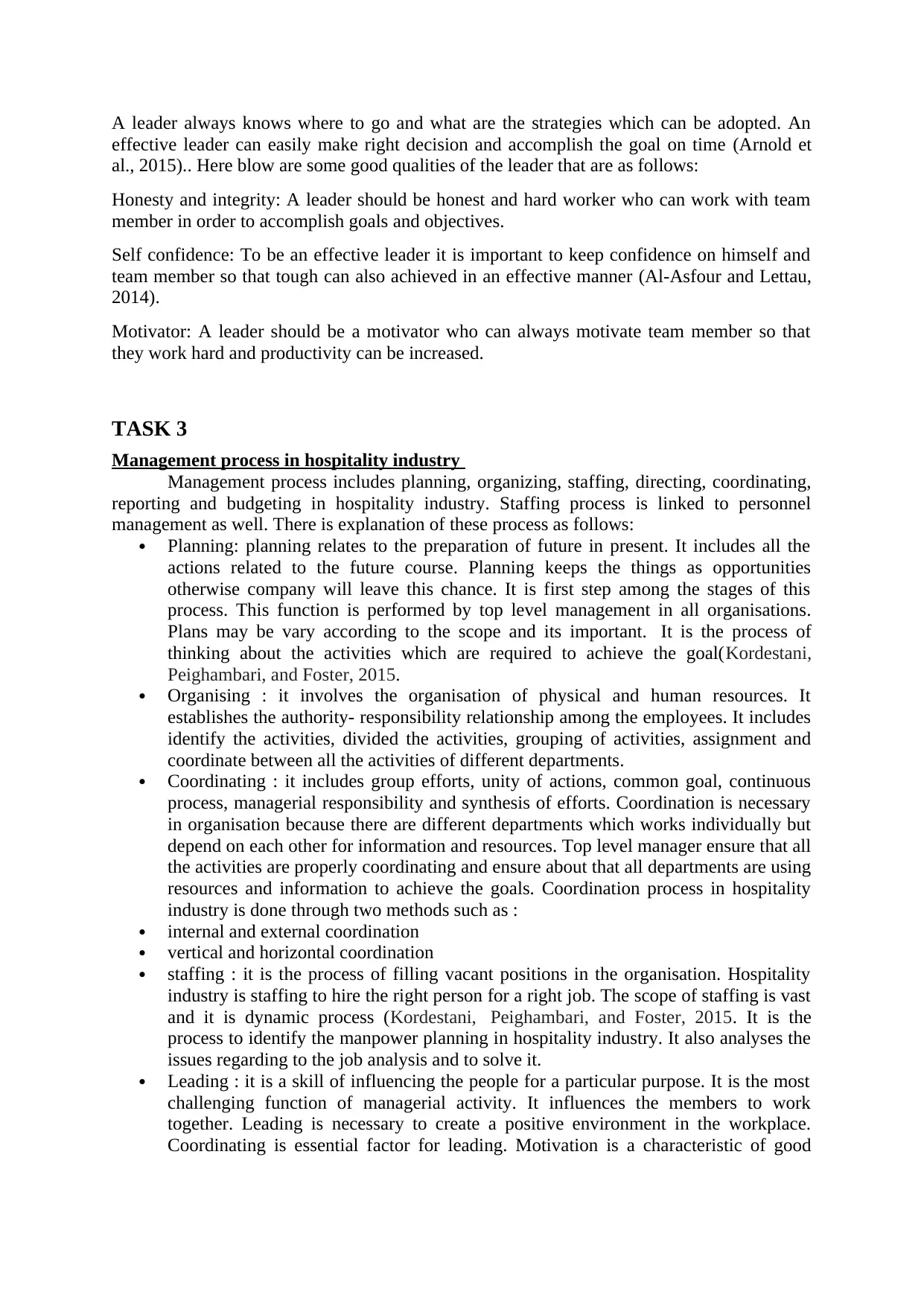
A leader always knows where to go and what are the strategies which can be adopted. An
effective leader can easily make right decision and accomplish the goal on time (Arnold et
al., 2015).. Here blow are some good qualities of the leader that are as follows:
Honesty and integrity: A leader should be honest and hard worker who can work with team
member in order to accomplish goals and objectives.
Self confidence: To be an effective leader it is important to keep confidence on himself and
team member so that tough can also achieved in an effective manner (Al-Asfour and Lettau,
2014).
Motivator: A leader should be a motivator who can always motivate team member so that
they work hard and productivity can be increased.
TASK 3
Management process in hospitality industry
Management process includes planning, organizing, staffing, directing, coordinating,
reporting and budgeting in hospitality industry. Staffing process is linked to personnel
management as well. There is explanation of these process as follows:
Planning: planning relates to the preparation of future in present. It includes all the
actions related to the future course. Planning keeps the things as opportunities
otherwise company will leave this chance. It is first step among the stages of this
process. This function is performed by top level management in all organisations.
Plans may be vary according to the scope and its important. It is the process of
thinking about the activities which are required to achieve the goal(Kordestani,
Peighambari, and Foster, 2015.
Organising : it involves the organisation of physical and human resources. It
establishes the authority- responsibility relationship among the employees. It includes
identify the activities, divided the activities, grouping of activities, assignment and
coordinate between all the activities of different departments.
Coordinating : it includes group efforts, unity of actions, common goal, continuous
process, managerial responsibility and synthesis of efforts. Coordination is necessary
in organisation because there are different departments which works individually but
depend on each other for information and resources. Top level manager ensure that all
the activities are properly coordinating and ensure about that all departments are using
resources and information to achieve the goals. Coordination process in hospitality
industry is done through two methods such as :
internal and external coordination
vertical and horizontal coordination
staffing : it is the process of filling vacant positions in the organisation. Hospitality
industry is staffing to hire the right person for a right job. The scope of staffing is vast
and it is dynamic process (Kordestani, Peighambari, and Foster, 2015. It is the
process to identify the manpower planning in hospitality industry. It also analyses the
issues regarding to the job analysis and to solve it.
Leading : it is a skill of influencing the people for a particular purpose. It is the most
challenging function of managerial activity. It influences the members to work
together. Leading is necessary to create a positive environment in the workplace.
Coordinating is essential factor for leading. Motivation is a characteristic of good
effective leader can easily make right decision and accomplish the goal on time (Arnold et
al., 2015).. Here blow are some good qualities of the leader that are as follows:
Honesty and integrity: A leader should be honest and hard worker who can work with team
member in order to accomplish goals and objectives.
Self confidence: To be an effective leader it is important to keep confidence on himself and
team member so that tough can also achieved in an effective manner (Al-Asfour and Lettau,
2014).
Motivator: A leader should be a motivator who can always motivate team member so that
they work hard and productivity can be increased.
TASK 3
Management process in hospitality industry
Management process includes planning, organizing, staffing, directing, coordinating,
reporting and budgeting in hospitality industry. Staffing process is linked to personnel
management as well. There is explanation of these process as follows:
Planning: planning relates to the preparation of future in present. It includes all the
actions related to the future course. Planning keeps the things as opportunities
otherwise company will leave this chance. It is first step among the stages of this
process. This function is performed by top level management in all organisations.
Plans may be vary according to the scope and its important. It is the process of
thinking about the activities which are required to achieve the goal(Kordestani,
Peighambari, and Foster, 2015.
Organising : it involves the organisation of physical and human resources. It
establishes the authority- responsibility relationship among the employees. It includes
identify the activities, divided the activities, grouping of activities, assignment and
coordinate between all the activities of different departments.
Coordinating : it includes group efforts, unity of actions, common goal, continuous
process, managerial responsibility and synthesis of efforts. Coordination is necessary
in organisation because there are different departments which works individually but
depend on each other for information and resources. Top level manager ensure that all
the activities are properly coordinating and ensure about that all departments are using
resources and information to achieve the goals. Coordination process in hospitality
industry is done through two methods such as :
internal and external coordination
vertical and horizontal coordination
staffing : it is the process of filling vacant positions in the organisation. Hospitality
industry is staffing to hire the right person for a right job. The scope of staffing is vast
and it is dynamic process (Kordestani, Peighambari, and Foster, 2015. It is the
process to identify the manpower planning in hospitality industry. It also analyses the
issues regarding to the job analysis and to solve it.
Leading : it is a skill of influencing the people for a particular purpose. It is the most
challenging function of managerial activity. It influences the members to work
together. Leading is necessary to create a positive environment in the workplace.
Coordinating is essential factor for leading. Motivation is a characteristic of good
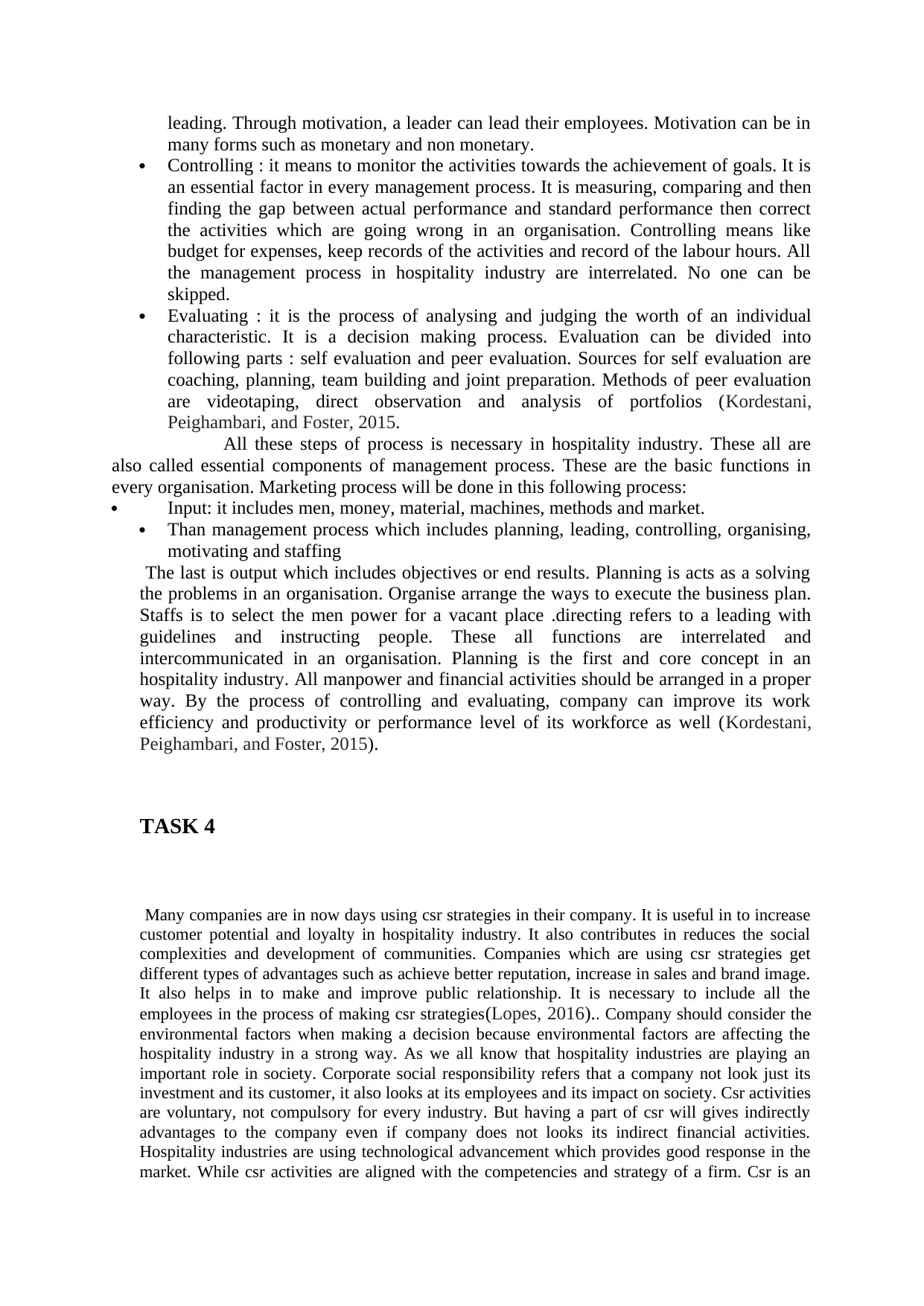
leading. Through motivation, a leader can lead their employees. Motivation can be in
many forms such as monetary and non monetary.
Controlling : it means to monitor the activities towards the achievement of goals. It is
an essential factor in every management process. It is measuring, comparing and then
finding the gap between actual performance and standard performance then correct
the activities which are going wrong in an organisation. Controlling means like
budget for expenses, keep records of the activities and record of the labour hours. All
the management process in hospitality industry are interrelated. No one can be
skipped.
Evaluating : it is the process of analysing and judging the worth of an individual
characteristic. It is a decision making process. Evaluation can be divided into
following parts : self evaluation and peer evaluation. Sources for self evaluation are
coaching, planning, team building and joint preparation. Methods of peer evaluation
are videotaping, direct observation and analysis of portfolios (Kordestani,
Peighambari, and Foster, 2015.
All these steps of process is necessary in hospitality industry. These all are
also called essential components of management process. These are the basic functions in
every organisation. Marketing process will be done in this following process:
Input: it includes men, money, material, machines, methods and market.
Than management process which includes planning, leading, controlling, organising,
motivating and staffing
The last is output which includes objectives or end results. Planning is acts as a solving
the problems in an organisation. Organise arrange the ways to execute the business plan.
Staffs is to select the men power for a vacant place .directing refers to a leading with
guidelines and instructing people. These all functions are interrelated and
intercommunicated in an organisation. Planning is the first and core concept in an
hospitality industry. All manpower and financial activities should be arranged in a proper
way. By the process of controlling and evaluating, company can improve its work
efficiency and productivity or performance level of its workforce as well (Kordestani,
Peighambari, and Foster, 2015).
TASK 4
Many companies are in now days using csr strategies in their company. It is useful in to increase
customer potential and loyalty in hospitality industry. It also contributes in reduces the social
complexities and development of communities. Companies which are using csr strategies get
different types of advantages such as achieve better reputation, increase in sales and brand image.
It also helps in to make and improve public relationship. It is necessary to include all the
employees in the process of making csr strategies(Lopes, 2016).. Company should consider the
environmental factors when making a decision because environmental factors are affecting the
hospitality industry in a strong way. As we all know that hospitality industries are playing an
important role in society. Corporate social responsibility refers that a company not look just its
investment and its customer, it also looks at its employees and its impact on society. Csr activities
are voluntary, not compulsory for every industry. But having a part of csr will gives indirectly
advantages to the company even if company does not looks its indirect financial activities.
Hospitality industries are using technological advancement which provides good response in the
market. While csr activities are aligned with the competencies and strategy of a firm. Csr is an
many forms such as monetary and non monetary.
Controlling : it means to monitor the activities towards the achievement of goals. It is
an essential factor in every management process. It is measuring, comparing and then
finding the gap between actual performance and standard performance then correct
the activities which are going wrong in an organisation. Controlling means like
budget for expenses, keep records of the activities and record of the labour hours. All
the management process in hospitality industry are interrelated. No one can be
skipped.
Evaluating : it is the process of analysing and judging the worth of an individual
characteristic. It is a decision making process. Evaluation can be divided into
following parts : self evaluation and peer evaluation. Sources for self evaluation are
coaching, planning, team building and joint preparation. Methods of peer evaluation
are videotaping, direct observation and analysis of portfolios (Kordestani,
Peighambari, and Foster, 2015.
All these steps of process is necessary in hospitality industry. These all are
also called essential components of management process. These are the basic functions in
every organisation. Marketing process will be done in this following process:
Input: it includes men, money, material, machines, methods and market.
Than management process which includes planning, leading, controlling, organising,
motivating and staffing
The last is output which includes objectives or end results. Planning is acts as a solving
the problems in an organisation. Organise arrange the ways to execute the business plan.
Staffs is to select the men power for a vacant place .directing refers to a leading with
guidelines and instructing people. These all functions are interrelated and
intercommunicated in an organisation. Planning is the first and core concept in an
hospitality industry. All manpower and financial activities should be arranged in a proper
way. By the process of controlling and evaluating, company can improve its work
efficiency and productivity or performance level of its workforce as well (Kordestani,
Peighambari, and Foster, 2015).
TASK 4
Many companies are in now days using csr strategies in their company. It is useful in to increase
customer potential and loyalty in hospitality industry. It also contributes in reduces the social
complexities and development of communities. Companies which are using csr strategies get
different types of advantages such as achieve better reputation, increase in sales and brand image.
It also helps in to make and improve public relationship. It is necessary to include all the
employees in the process of making csr strategies(Lopes, 2016).. Company should consider the
environmental factors when making a decision because environmental factors are affecting the
hospitality industry in a strong way. As we all know that hospitality industries are playing an
important role in society. Corporate social responsibility refers that a company not look just its
investment and its customer, it also looks at its employees and its impact on society. Csr activities
are voluntary, not compulsory for every industry. But having a part of csr will gives indirectly
advantages to the company even if company does not looks its indirect financial activities.
Hospitality industries are using technological advancement which provides good response in the
market. While csr activities are aligned with the competencies and strategy of a firm. Csr is an
Secure Best Marks with AI Grader
Need help grading? Try our AI Grader for instant feedback on your assignments.
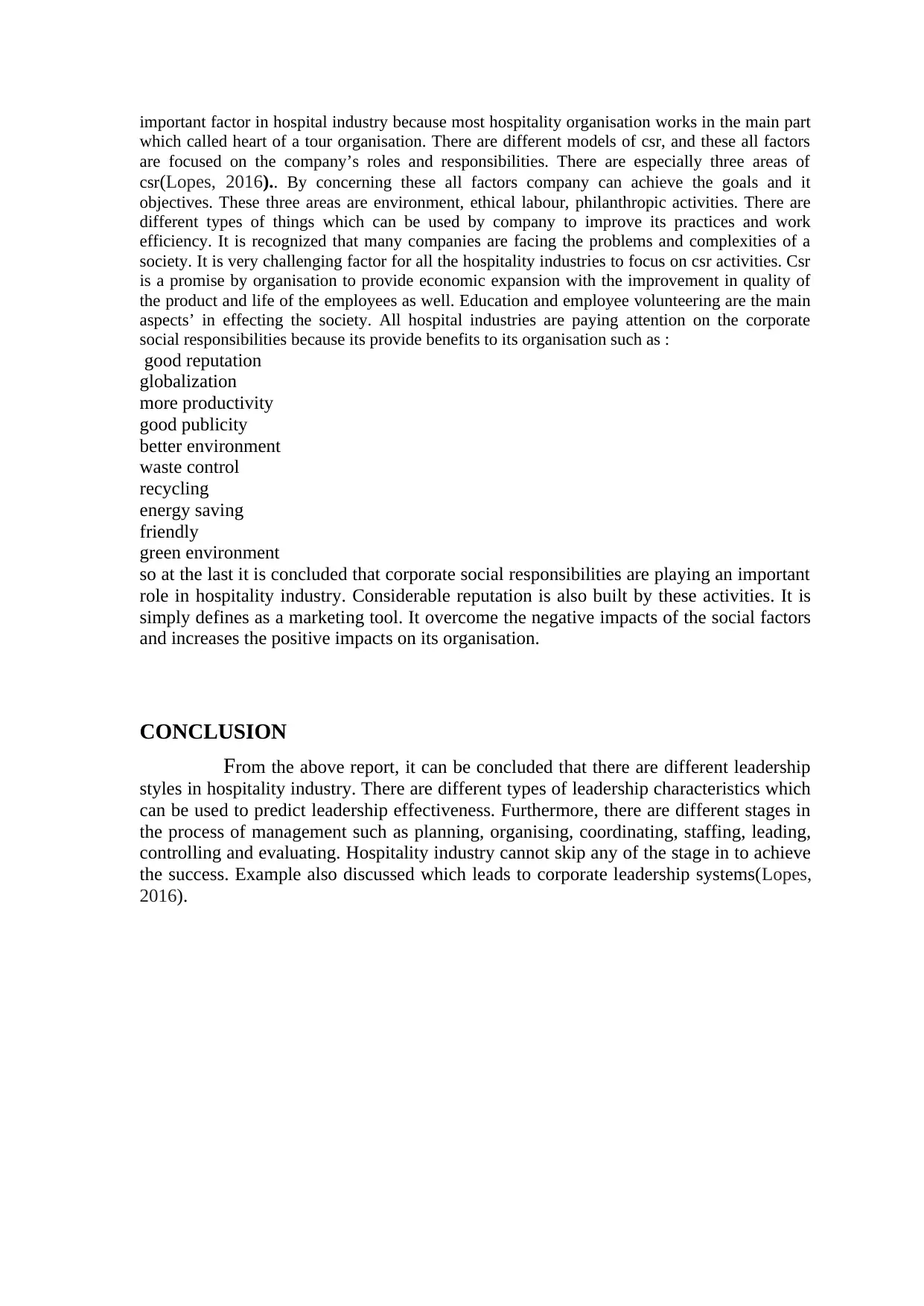
important factor in hospital industry because most hospitality organisation works in the main part
which called heart of a tour organisation. There are different models of csr, and these all factors
are focused on the company’s roles and responsibilities. There are especially three areas of
csr(Lopes, 2016).. By concerning these all factors company can achieve the goals and it
objectives. These three areas are environment, ethical labour, philanthropic activities. There are
different types of things which can be used by company to improve its practices and work
efficiency. It is recognized that many companies are facing the problems and complexities of a
society. It is very challenging factor for all the hospitality industries to focus on csr activities. Csr
is a promise by organisation to provide economic expansion with the improvement in quality of
the product and life of the employees as well. Education and employee volunteering are the main
aspects’ in effecting the society. All hospital industries are paying attention on the corporate
social responsibilities because its provide benefits to its organisation such as :
good reputation
globalization
more productivity
good publicity
better environment
waste control
recycling
energy saving
friendly
green environment
so at the last it is concluded that corporate social responsibilities are playing an important
role in hospitality industry. Considerable reputation is also built by these activities. It is
simply defines as a marketing tool. It overcome the negative impacts of the social factors
and increases the positive impacts on its organisation.
CONCLUSION
From the above report, it can be concluded that there are different leadership
styles in hospitality industry. There are different types of leadership characteristics which
can be used to predict leadership effectiveness. Furthermore, there are different stages in
the process of management such as planning, organising, coordinating, staffing, leading,
controlling and evaluating. Hospitality industry cannot skip any of the stage in to achieve
the success. Example also discussed which leads to corporate leadership systems(Lopes,
2016).
which called heart of a tour organisation. There are different models of csr, and these all factors
are focused on the company’s roles and responsibilities. There are especially three areas of
csr(Lopes, 2016).. By concerning these all factors company can achieve the goals and it
objectives. These three areas are environment, ethical labour, philanthropic activities. There are
different types of things which can be used by company to improve its practices and work
efficiency. It is recognized that many companies are facing the problems and complexities of a
society. It is very challenging factor for all the hospitality industries to focus on csr activities. Csr
is a promise by organisation to provide economic expansion with the improvement in quality of
the product and life of the employees as well. Education and employee volunteering are the main
aspects’ in effecting the society. All hospital industries are paying attention on the corporate
social responsibilities because its provide benefits to its organisation such as :
good reputation
globalization
more productivity
good publicity
better environment
waste control
recycling
energy saving
friendly
green environment
so at the last it is concluded that corporate social responsibilities are playing an important
role in hospitality industry. Considerable reputation is also built by these activities. It is
simply defines as a marketing tool. It overcome the negative impacts of the social factors
and increases the positive impacts on its organisation.
CONCLUSION
From the above report, it can be concluded that there are different leadership
styles in hospitality industry. There are different types of leadership characteristics which
can be used to predict leadership effectiveness. Furthermore, there are different stages in
the process of management such as planning, organising, coordinating, staffing, leading,
controlling and evaluating. Hospitality industry cannot skip any of the stage in to achieve
the success. Example also discussed which leads to corporate leadership systems(Lopes,
2016).
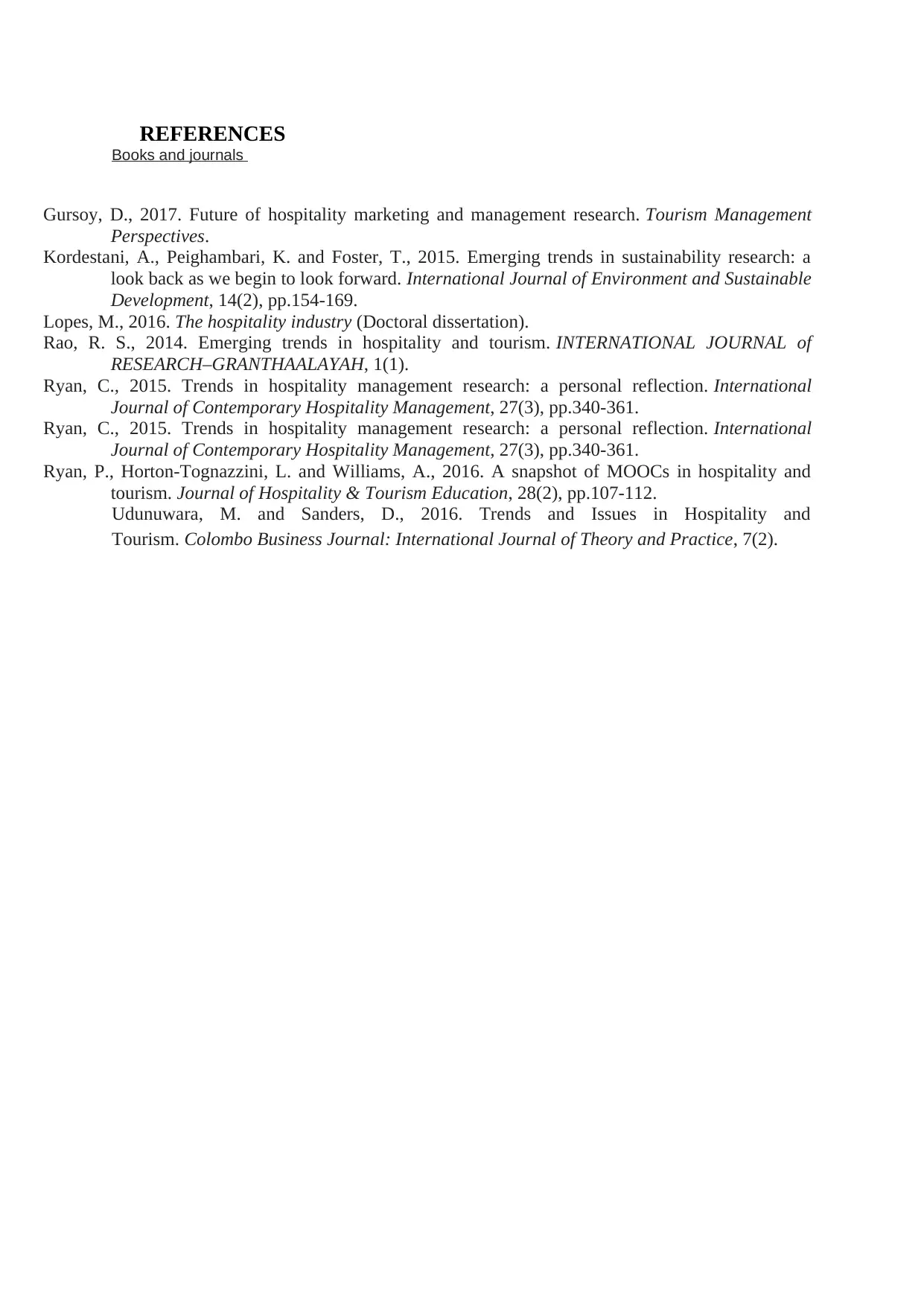
REFERENCES
Books and journals
Gursoy, D., 2017. Future of hospitality marketing and management research. Tourism Management
Perspectives.
Kordestani, A., Peighambari, K. and Foster, T., 2015. Emerging trends in sustainability research: a
look back as we begin to look forward. International Journal of Environment and Sustainable
Development, 14(2), pp.154-169.
Lopes, M., 2016. The hospitality industry (Doctoral dissertation).
Rao, R. S., 2014. Emerging trends in hospitality and tourism. INTERNATIONAL JOURNAL of
RESEARCH–GRANTHAALAYAH, 1(1).
Ryan, C., 2015. Trends in hospitality management research: a personal reflection. International
Journal of Contemporary Hospitality Management, 27(3), pp.340-361.
Ryan, C., 2015. Trends in hospitality management research: a personal reflection. International
Journal of Contemporary Hospitality Management, 27(3), pp.340-361.
Ryan, P., Horton-Tognazzini, L. and Williams, A., 2016. A snapshot of MOOCs in hospitality and
tourism. Journal of Hospitality & Tourism Education, 28(2), pp.107-112.
Udunuwara, M. and Sanders, D., 2016. Trends and Issues in Hospitality and
Tourism. Colombo Business Journal: International Journal of Theory and Practice, 7(2).
Books and journals
Gursoy, D., 2017. Future of hospitality marketing and management research. Tourism Management
Perspectives.
Kordestani, A., Peighambari, K. and Foster, T., 2015. Emerging trends in sustainability research: a
look back as we begin to look forward. International Journal of Environment and Sustainable
Development, 14(2), pp.154-169.
Lopes, M., 2016. The hospitality industry (Doctoral dissertation).
Rao, R. S., 2014. Emerging trends in hospitality and tourism. INTERNATIONAL JOURNAL of
RESEARCH–GRANTHAALAYAH, 1(1).
Ryan, C., 2015. Trends in hospitality management research: a personal reflection. International
Journal of Contemporary Hospitality Management, 27(3), pp.340-361.
Ryan, C., 2015. Trends in hospitality management research: a personal reflection. International
Journal of Contemporary Hospitality Management, 27(3), pp.340-361.
Ryan, P., Horton-Tognazzini, L. and Williams, A., 2016. A snapshot of MOOCs in hospitality and
tourism. Journal of Hospitality & Tourism Education, 28(2), pp.107-112.
Udunuwara, M. and Sanders, D., 2016. Trends and Issues in Hospitality and
Tourism. Colombo Business Journal: International Journal of Theory and Practice, 7(2).
1 out of 6
Related Documents
Your All-in-One AI-Powered Toolkit for Academic Success.
+13062052269
info@desklib.com
Available 24*7 on WhatsApp / Email
![[object Object]](/_next/static/media/star-bottom.7253800d.svg)
Unlock your academic potential
© 2024 | Zucol Services PVT LTD | All rights reserved.





